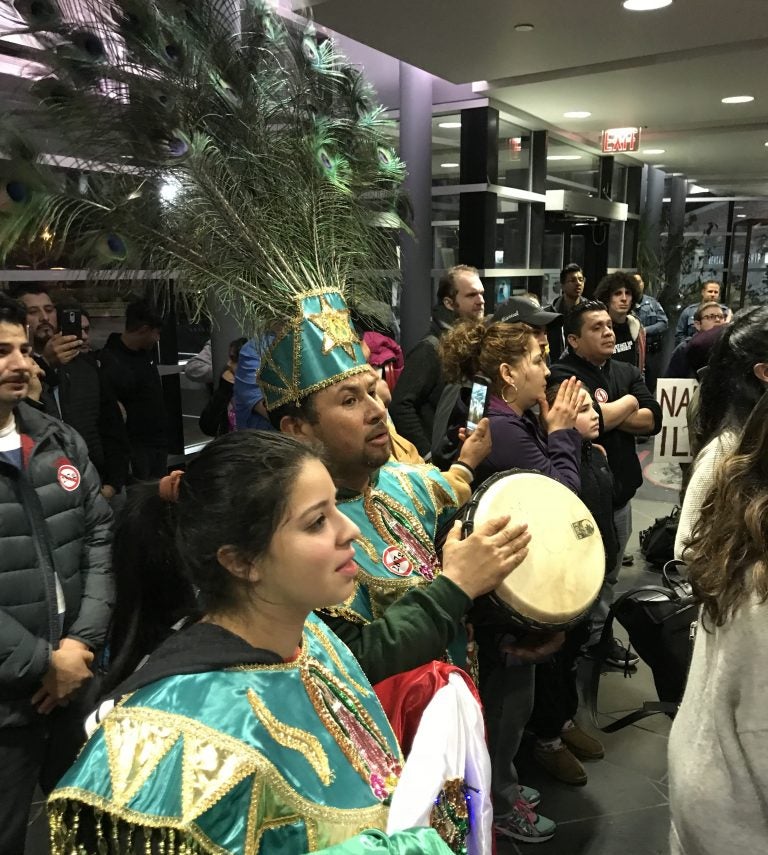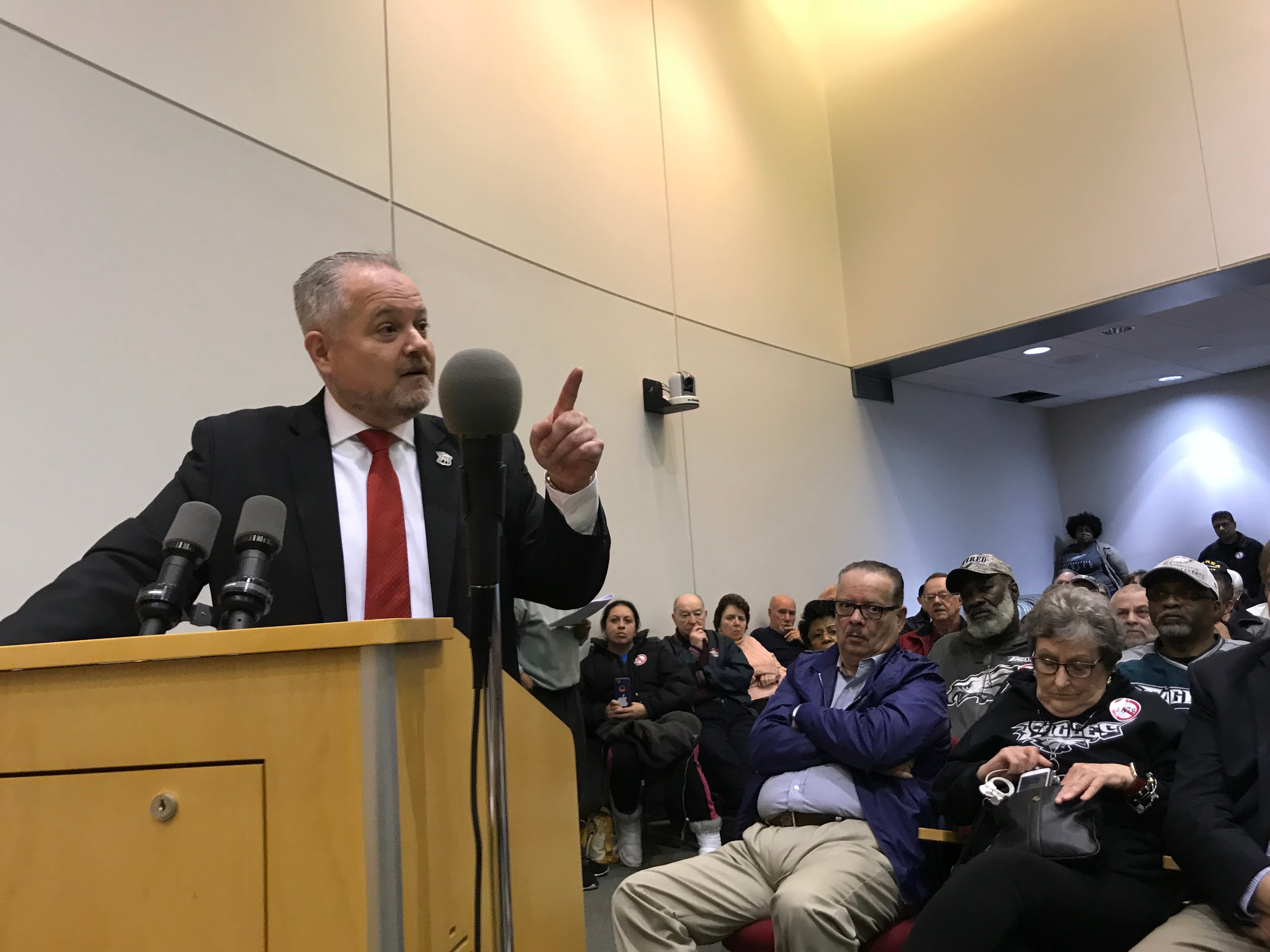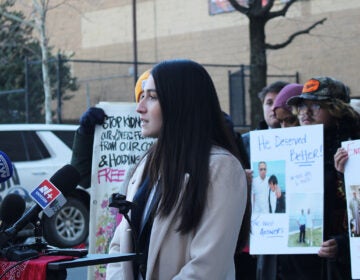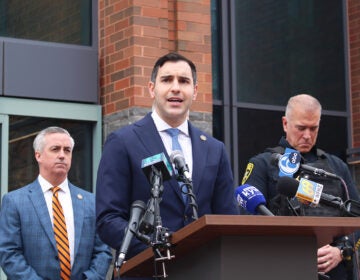Bucks Co. township’s effort to partner with ICE sparks fears of racial profiling
A proposed partnership between the Bensalem Township police department and federal immigration enforcement derailed a run-of-the-mill township council meeting Monday night.

Fifty protesters chanted and held signs in an overflow room at the Bensalem Township municipal building on January 22, 2018. (Laura Benshoff/WHYY)
A proposed partnership between a Bucks County police department and federal immigration enforcement derailed a run-of-the-mill township council meeting Monday night.
Around 200 attendees packed the Bensalem Municipal Building, some carrying drums and wearing green peacock feather headdresses, to voice their opposition to a plan to train local police to evaluate people they come into contact with for immigration offenses.
Such a partnership — called a 287(g) agreement after the part of U.S. immigration law authorizing the collaboration — would be the first of its kind in Pennsylvania. As a result, activists from around Bucks County, the local chapter of the NAACP, and immigrants rights groups from across the state showed up to weigh in. Among their concerns about the potential partnership is that it would make undocumented immigrants in the township too afraid to report crimes or trust local police.
“Be assured that we will stand up, we will fight it, we will not go away, we are not afraid, and we will fight back until this is defeated,” said Adanjesus Marin, an activist with Make the Road Pennsylvania, who came from Allentown for the meeting.

Bensalem’s Public Safety Director Fred Harran sought to head off concerns about a possible chilling effect before the public comment portion of the meeting by underscoring that the partnership is aimed at reducing crime.
“I think this will put your minds at ease,” he said. “When someone reports a crime, or is a victim of a crime, we do not and will not ask them what their status is.”
The township already refers people in its custody who are in the country illegally to ICE, said Harran.
In 2016, Bensalem’s overall crime rate was higher than the county average — although by how much varied widely between categories, according to Pennsylvania’s Unified Crime Reporting database.
All but one speaker shared concerns that even if made with good intentions, a policy of deputizing local police to do immigration enforcement would lead to racial profiling.
“We have to face this racism among the police. What’s going to stop them? This is only going to make it worse,” said Bonnie Morales, who explained her husband is Latino and receives more scrutiny from local law enforcement as a result.
“I don’t believe our police department is racist,” responded council member Edward Kisselback.
“Excuse me, sir. I have my husband standing right here,” said Morales. “You don’t believe it, but I’ve seen it.”
Outside the meeting room, drums pounded and cheers erupted from the overflow crowd after each point. Some speakers also raised concerns about the costs to the township, which has a $48 million budget deficit.
“I don’t get why a local agency needs to do a federal agency’s work,” said Melanie Goldstein of Bensalem.
Under 287(g) agreements, local police departments continue to pay the salaries of officers trained by ICE, while ICE pays some of the technology costs associated with connecting the department to federal immigration databases.
In Bensalem, a township with a population of 60,000 that hugs Philadelphia’s northeast corner, about one out of every six people was born outside of the country, according to the U.S. Census. Due to this diversity, the potential for eroding trust between the police and the community was a theme during the meeting.
“Our children are going to end up hating the police, and running from them,” said Morales.
After public comment closed, Council President Joseph Pilieri thanked the attendees. He and council member Ed Tokmajian said they would look into the community’s concerns and hoped to open a dialogue with Harran about the 287(g) proposal.
In a statement, ICE officials said they stopped deputizing local police with 287(g) agreements in 2012, under President Obama. The only local government agencies that have the agreements now are county jails, including two in southern New Jersey.
WHYY is your source for fact-based, in-depth journalism and information. As a nonprofit organization, we rely on financial support from readers like you. Please give today.




